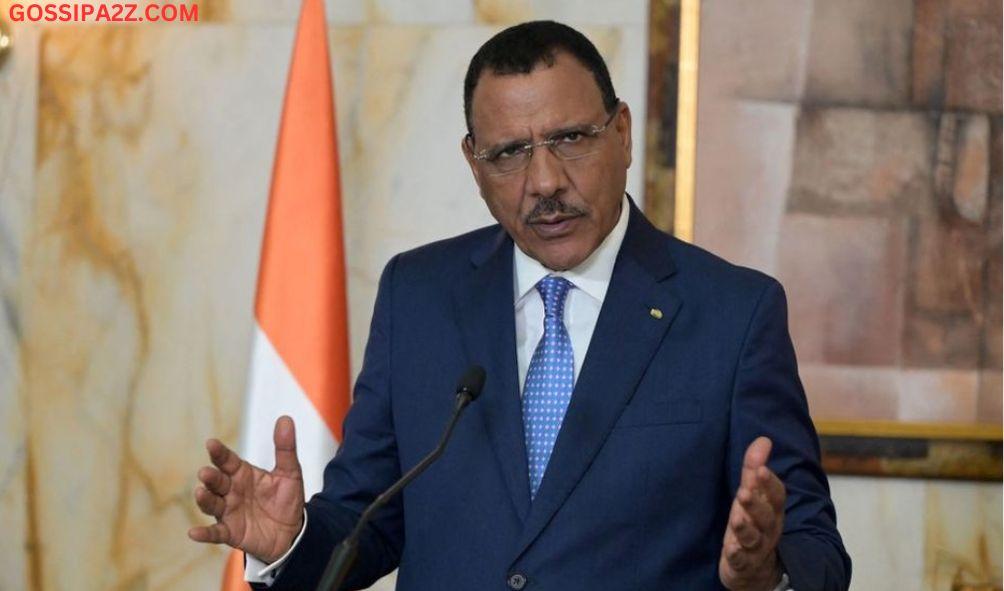Neighboring Nations’ Intervention Risks Ousted President’s Life: Niger Junta’s Warning
Niger’s military leadership warned that they would execute former President Mohamed Bazoum if neighboring nations tried any armed intervention to reinstate his presidency, as stated by two officials from Western countries.
Unnamed Western military personnel informed The Associated Press that during her recent visit to the nation, U.S. Undersecretary of State Victoria Nuland was informed by junta representatives that they would assassinate Bazoum if any foreign interference was tried. The source requested anonymity due to the delicate nature of the matter.
An account was verified by a U.S. official, who also spoke anonymously due to lacking authorization to communicate with the media, as reported by the AP.
The authorities communicated with the Associated Press just before the activation of a prepared military unit by the West African coalition ECOWAS. This force could potentially be deployed to reinstate democratic governance in Niger. ECOWAS, known as the Economic Community of West African States, had set a deadline for military leaders to undo the coup, which expired this past Sunday.
After the passing of the Sunday deadline, the Nigerien military shut down the national airspace, attributing this action to concerns about potential external involvement. Furthermore, the military is committed to safeguarding the nation against any hostile actions from abroad.
On Thursday, ECOWAS issued a directive to activate its standby force, expressing optimism about the potential peaceful reinstatement of the constitutional government in Niger following the coup on July 26th.
ALSO READ: Health Concerns for Ousted Niger President: US and UN Worried
The declaration was made on Thursday through a statement read after a local meeting in Abuja, which serves as Nigeria’s capital city.
However, the leaders of Niger’s junta declined the regional meeting’s effort to engage in peaceful discussions to resolve the crisis. Instead, they appointed a fresh government consisting of 21 ministers.
The announcement on state television identified three individuals who led the coups, and they were designated to lead the defense, interior, and sports ministries. However, no additional details about future intentions were provided in the announcement.
U.S. Secretary of State Antony Blinken expressed his endorsement for ECOWAS, although he didn’t directly endorse the summit’s plea for military involvement.
“ECOWAS, an organization that brings together West African countries, is playing a key role in making clear the imperative of a return to constitutional order, and we very much support ECOWAS’s leadership and work on this,” he said.
In the past few days, the United States has advised that the preferred approach to address the crisis is through diplomacy, reserving the option of military action as a final measure.
The former leader of Niger, who was removed from power, has been held in confinement at his home by the presidential guard after they assumed control. On Wednesday, Bazoum’s political party reported that he and his family were depleting their food supplies and enduring a week-long period without electricity and tap water. An advisor informed The Associated Press that the family’s remaining sustenance consisted solely of rice and canned products.
ALSO READ: US Envoy Meets Niger Coup Leaders, No Progress
“We have a deep concern for him, for his family, for his security and well-being,” Blinken said. “We’ve also made clear to the military leaders that we will hold them responsible for his safety and well-being.”
A movement was initiated by a former rebel leader and politician from Niger on Wednesday. This movement opposes the military junta that took control of the government two weeks ago. This marks the initial instance of structured opposition to the rule of the army in the nation.
In a communication, Rhissa Ag Boula conveyed that his organization, known as the Council of the Resistance for the Republic, intends to work towards the restoration of Bazoum to his former position.
Boula, having served as a past tourism minister, emerged as a prominent figure in two instances of Tuareg ethnic uprisings within Niger. The first uprising occurred during the 1990s, while the second took place between 2007 and 2009.
Until Wednesday, the military junta in Niger had been dismissing diplomatic efforts.
However, despite having closed borders, they granted entry to two diplomats dispatched by Nigerian President Bola Tinubu: Lamido Muhammad Sanusi and Abdullsalami Abubarkar, who are both notable figures in traditional leadership.
Sanusi had a meeting with General Abdourahamane Tchiani, who orchestrated the coup, while Abukarkar held discussions with additional delegates at the airport.
“We’ll continue to do our best to bring the two parties together to improve understanding. This is the time for public diplomacy,” Sanusi told reporters upon his return to Abuja.
ALSO READ: Niger Shuts Airspace Amid President’s Reinstatement Denial
The day prior, the military junta in Niger declined an offered diplomatic initiative by West African nations, the African Union, and the United Nations. The junta’s leadership cited an environment of perceived hostility, rendering discussions about resolving Niger’s constitutional crisis unfeasible.
Late on Tuesday, ECOWAS said in a statement that it would “continue to deploy all measures to restore constitutional order in Niger.” The 15-member bloc, along with Western allies of Niger, has placed a series of financial sanctions against the country since the coup. The financial sanctions could lead to a default on Niger’s debt repayments, Reuters reported.
Meanwhile, the U.S. Embassy has advised American citizens to steer clear of the presidential palace and the central areas of Niamey, the capital. They’ve cautioned about heightened security measures in place to oversee protests.
On Wednesday, the embassy acknowledged that reports were indicating a shortage of cash and certain commodities.
On Tuesday, a representative from the U.S. State Department expressed optimism about the potential to overturn the coup in Niger but also acknowledged a sense of realism.
Department spokesman Matthew Miller told reporters, “We are making clear, including in direct conversations with junta leaders themselves, what the consequences are for failing to return to constitutional order.”
Neighboring Nations’ Intervention Risks Ousted President’s Life: Niger Junta’s Warning
